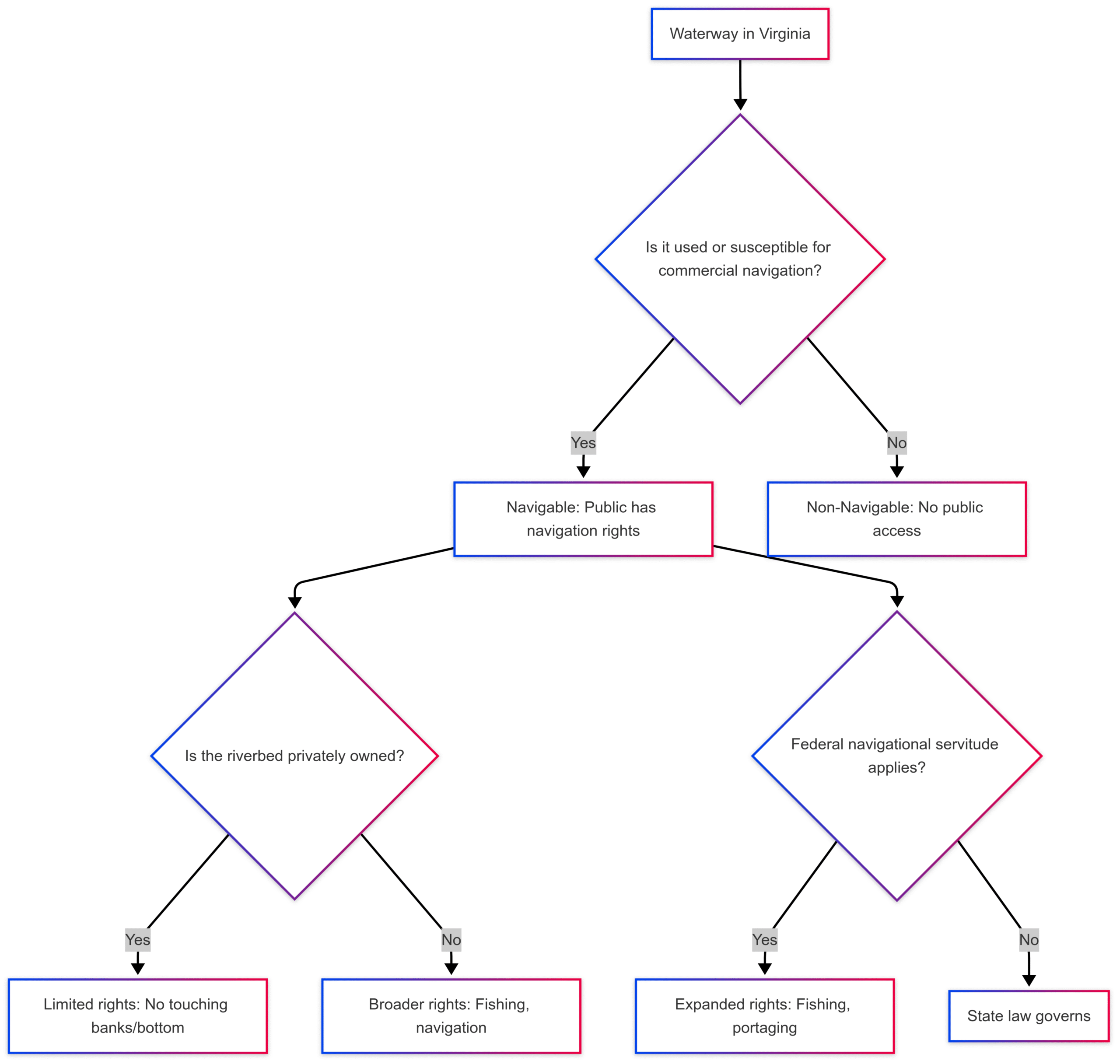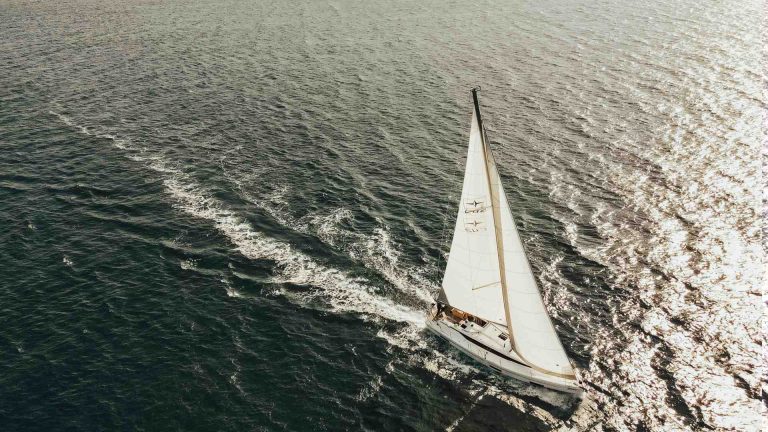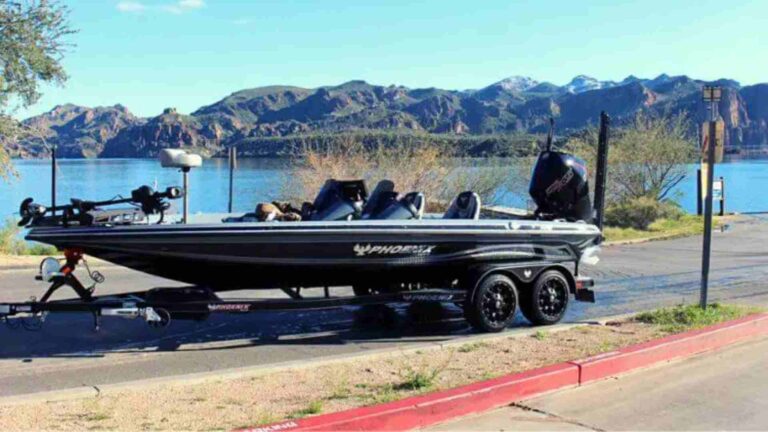Virginia Boating Laws and Regulations
Explore Virginia boating laws, safety regulations, equipment requirements, and navigability rules for a safe and compliant experience on the water.
Boating in Virginia offers a unique opportunity to explore its scenic waterways, from the Chesapeake Bay to inland rivers and lakes. However, with this privilege comes the responsibility to adhere to Virginia’s boating laws and regulations, designed to ensure safety, protect the environment, and maintain order on the water. This guide provides a detailed overview of Virginia’s boating requirements, including safety practices, equipment mandates, navigability laws, and registration processes, to help boaters navigate the state’s waterways confidently and legally.
Safe Boating Practices in Virginia
Safe boating is the cornerstone of Virginia’s boating regulations. Boaters are required to practice good seamanship, which includes maintaining a proper lookout at all times and operating at a safe speed based on conditions such as wind, water, visibility, and vessel traffic. Virginia enforces “safe speed” laws, ensuring that boaters adjust their speed to avoid collisions or hazards.
A critical aspect of safe boating is respecting “no wake” zones, where boaters must operate at the slowest speed possible while maintaining steerage. These zones are typically near docks, piers, boat ramps, or areas with swimmers to prevent damage or injury. Violating no-wake zones can result in fines and endanger others.
Boaters must also follow navigational rules, including right-of-way protocols and sound signal requirements. For example, when two power-driven vessels approach head-on, both should alter course to starboard to avoid collision. Understanding these rules is essential to prevent accidents, especially in Virginia’s busy waterways during peak seasons.
Required Safety Equipment
Virginia mandates that all vessels carry specific safety equipment to protect passengers and other waterway users. The following table outlines the key requirements:
| Equipment | Requirement |
|---|---|
| Life Jackets (PFDs) | One U.S. Coast Guard-approved wearable PFD per person. Children under 13 must wear a PFD while underway unless below deck or in an enclosed cabin. |
| Throwable Flotation Device | One Type IV PFD (e.g., ring buoy or seat cushion) for vessels 16 feet or longer, except for PWCs, non-motorized canoes/kayaks, and certain racing vessels. |
| Sound-Producing Device | A whistle, horn, or bell to signal intentions or warn others, required on all vessels. |
| Navigation Lights | Required for operation between sunset and sunrise or during restricted visibility. |
| Fire Extinguisher | B-1 class fire extinguisher required for motorized vessels and PWCs with enclosed fuel compartments. |
Personal watercraft (PWC) operators and passengers must wear a Type I, II, III, or V PFD at all times, and inflatable PFDs are not permitted for high-impact activities like water skiing or PWC operation. Ensuring that all equipment is in good working condition before each trip is critical to compliance and safety.
Personal Watercraft (PWC) Regulations
PWCs, such as jet skis, are subject to stricter regulations due to their speed and maneuverability. In addition to adhering to general boating rules, PWC operators must follow these specific requirements:
- Age Restrictions: No one under 14 may operate a PWC. Operators aged 14–15 must complete a National Association of State Boating Law Administrators (NASBLA)-approved boating safety course and carry proof of completion.
- PFD Requirement: Everyone on board or being towed by a PWC must wear a Coast Guard-approved PFD.
- No-Wake Zones: PWCs must reduce speed to no-wake within 50 feet of docks, piers, boathouses, boat ramps, swimmers, or other vessels (except when towing a skier with a rope under 50 feet).
- Operating Hours: PWCs may only be operated from sunrise to sunset.
PWCs must also be registered with the Virginia Department of Wildlife Resources (DWR) and carry a B-1 class fire extinguisher. These regulations ensure that PWCs, despite their small size, are operated with the same respect as larger vessels.
Towing Regulations
Boating activities involving towing, such as water skiing or wakeboarding, require additional precautions. Virginia law mandates:
- Time Restrictions: Towing is permitted only during daylight hours, from sunrise to sunset.
- Observer Requirement: A competent observer, in addition to the operator, must monitor the person being towed.
- Safety Precautions: The tow rope must be of sufficient length to avoid collisions, and the vessel must maintain a safe distance from other boats, swimmers, and structures.
These rules help prevent accidents, as towing activities increase the risk of collisions or injuries due to divided attention.
Boating Safety Education
Virginia prioritizes education to enhance waterway safety. Operators of PWCs (age 14 and older) and motorboats with engines of 10 horsepower or greater must complete a NASBLA-approved boating safety course. These courses, available online or in-person, cover essential topics such as navigation rules, safety equipment, and emergency procedures.
Upon completion, operators receive a Boater Education Card, which must be carried while operating a vessel. This requirement not only improves safety but may also reduce insurance premiums for boat owners. Boaters are encouraged to take refresher courses periodically to stay updated on regulations and best practices.
Boat Registration and Titling
All motorized vessels, including those powered by gasoline, diesel, or electric motors, and sailboats over 18 feet in length, must be registered with the Virginia DWR. The registration process involves obtaining a Certificate of Number and a Certificate of Title, which serve as proof of ownership and legal operation.
Registration Requirements
- Application: Submit an application to the DWR with the required fees.
- Certificate of Number: A pocket-sized registration card valid for three years, which must be signed and carried on board.
- Display: The assigned registration number must be displayed on both sides of the vessel’s forward half, with decals indicating the expiration date placed within 6 inches of the number.
- Renewal: Registration must be renewed every three years.
Exemptions
- Vessels used exclusively on private waters.
- Non-motorized canoes, kayaks, or sailboats under 18 feet.
- Vessels registered in another state and not kept in Virginia for more than 90 consecutive days.
Titling
Motorized vessels and sailboats over 18 feet require a title, except for those federally documented by the U.S. Coast Guard. Trailers for watercraft are titled and licensed through the Virginia Department of Motor Vehicles (DMV).
Costs
The following table outlines approximate registration and titling fees (subject to change; check with DWR for current rates):
| Service | Approximate Cost |
|---|---|
| Registration (3 years) | $27–$47 (based on vessel length) |
| Title | $10 |
| Renewal | $27–$47 |
| Duplicate Title/Certificate | $7 |
New owners may operate a previously registered vessel for 30 days with a dated bill of sale and the former owner’s Certificate of Number.
Alcohol and Boating Under the Influence (BUI)
Operating a vessel under the influence of alcohol or drugs is illegal in Virginia and carries severe penalties. A blood alcohol content (BAC) of 0.08% or higher presumes intoxication, but impairment can be established at lower levels. Penalties for BUI include:
- Fines up to $2,500.
- Imprisonment for up to 12 months.
- Revocation of boating privileges for up to three years.
- Mandatory enrollment in the Virginia Alcohol Safety Program.
By operating on Virginia waters, boaters consent to breath or blood tests to determine BAC or drug levels. Refusal to submit to testing may result in the revocation of boating privileges. Additionally, a “Zero Tolerance” policy prohibits individuals under 21 from operating a vessel with any measurable alcohol level.
Navigability and Public Rights in Virginia Waterways
Virginia’s approach to navigability and public boating rights is unique and complex, rooted in historical legal traditions and strict definitions. Understanding these laws is crucial for boaters to avoid trespassing or legal disputes.
State Test of Navigability
Virginia courts apply a “navigable-in-fact” test, determining navigability based on a waterway’s use or susceptibility for use as a highway for commerce in its natural condition. This test focuses on commercial navigation, not recreational use, making it stricter than in some other states. For example, a river was deemed non-navigable when attempts to float commercial logs failed due to impracticality.
Federal courts, however, may apply a broader commerce test, leading to occasional discrepancies. For instance, a federal court found a river navigable that a state court had ruled non-navigable, possibly due to additional evidence. This creates uncertainty, but federal law may offer more favorable outcomes for boaters asserting navigational rights.
Public Rights in Navigable vs. Non-Navigable Waters
- Non-Navigable Streams: The public has no rights, and access is restricted to landowners’ permission.
- Navigable Streams: The public has the right to navigate and use the surface. However, if the riverbed is privately owned—a common occurrence in Virginia due to historical Crown grants—boaters may not touch the banks or bottom or engage in activities like fishing without permission.
The federal navigational servitude, which applies to waters used in interstate commerce, may override state restrictions. For example, fishing may be permitted as an incident to navigation under federal law, even in privately owned riverbeds. Portaging, though not explicitly addressed in Virginia case law, is likely permissible as an incident to navigation, especially under federal jurisdiction.
Ownership of Riverbeds
Virginia’s adoption of English common law complicates public access. Under this system:
- Tidal Waters: The Crown (now the state) owns the riverbeds.
- Non-Tidal Navigable Waters: Adjoining landowners often own the riverbeds, though some court decisions suggest public ownership, leaving the issue unresolved.
This private ownership limits recreational rights, as boaters may face restrictions on anchoring, wading, or fishing in navigable but privately owned waters.
Chart: Navigability Decision Process
Below is a flowchart illustrating how navigability is determined in Virginia:

This chart highlights the layered considerations of state and federal law in determining boating rights.
Local Ordinances and Regulatory Markers
Boaters must comply with local ordinances, which may impose additional restrictions, such as extended no-wake zones or specific docking rules. Regulatory markers, such as buoys indicating no-wake zones or restricted areas, must be respected. Interfering with these markers is illegal and can result in fines.
Boating Safety Tips for Virginia’s Waterways
Beyond legal compliance, adopting best practices ensures a safe and enjoyable boating experience. Here are practical tips:
- Wear Life Jackets: Ensure all passengers have properly fitted PFDs, and children under 13 wear them at all times.
- File a Float Plan: Share your itinerary, including destination and return time, with a trusted contact.
- Check Weather: Monitor forecasts and return to shore if conditions deteriorate.
- Maintain Your Vessel: Inspect engines, fuel systems, and safety equipment before each trip.
- Stay Sober: Avoid alcohol and drugs to maintain clear judgment.
- Use Navigation Lights: Operate lights during low visibility or nighttime to enhance visibility.
- Respect Wildlife: Avoid disturbing habitats or violating fishing regulations.
- Stay Alert: Monitor for other vessels, swimmers, and hazards, especially in crowded areas.
Taking a boating safety course can further equip boaters with the skills to handle emergencies and navigate safely.
Legal Support for Boating Accidents
Boating accidents, often caused by violations of safety regulations or operator negligence, can have devastating consequences. If involved in an accident, consulting a legal professional familiar with Virginia’s boating laws is advisable. Firms like NovaLegalGroup, P.C., specialize in representing victims, investigating accidents, and navigating the complex interplay of state and federal regulations. They can also provide guidance on preventive measures to avoid future incidents.
Conclusion
Boating in Virginia is a rewarding experience, but it requires a thorough understanding of the state’s laws and regulations. From mandatory safety equipment and PWC restrictions to navigability laws and registration requirements, compliance is essential for safety and legal protection. By adopting safe practices, respecting navigational rules, and staying informed about local ordinances, boaters can enjoy Virginia’s waterways responsibly. Whether you’re a seasoned boater or a novice, prioritizing safety and education ensures that your time on the water is both enjoyable and secure.
For further information, visit the Virginia Department of Wildlife Resources website or contact legal professionals for personalized guidance.
Happy Boating!
Share Virginia Boating Laws and Regulations with your friends and leave a comment below with your thoughts.
Read Boating Classifieds: Navigating the Seas of Possibility until we meet in the next article.






